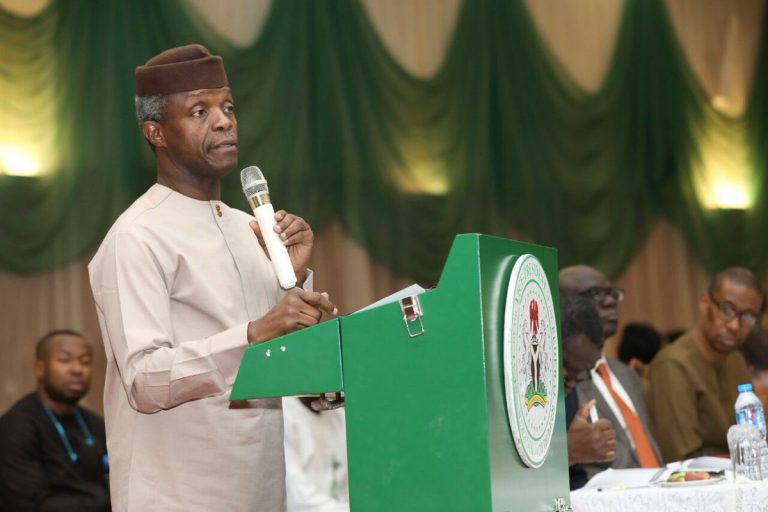• FG Captures 60% Of Workforce On IPPIS, Saves N109.47bn
Vice President Yemi Osinbajo, on Monday lamented a situation where 30% of Nigeria’s available foreign exchange is spent on importing refined petroleum product, expressing hope that the situation would change by the end of 2018, when the country is expected to attain self-sufficiency in the sector.
The Vice President’s enthusiasm, according to statement released by Laolu Akande, Senior Special Assistant-Media & Publicity to the President, Office of the Vice President, is possibly based on the ongoing 650,000 barrel per day capacity Dangote Petroleum Refinery and Petro-Chemical plant based in Lagos, which is now nearing completion and is expected to open for business early next year.
Speaking on “detailing progress in Buhari’s economic plan,” at The Platform, organized by the Covenant Christian Centre, Lagos, he noted that investment in the largest single line refinery in the world, as well as a subsea pipeline, cost almost $12bn.
“We are trying to attract the huge investments in the oil sector and in petrochemicals; we are seeing more investment activity in the oil sector with the resolution of the joint venture cash calls issues with the IOC’s that we were able to achieve. It is clear that we are gradually attracting some foreign investments into the economy.”
Also important, he continued, is the fact that the Muhammadu Buhari administration has instilled fiscal discipline and checking the culture of waste in public expenditure, saiving N109.47bn.
One way this has been done, he said, is the capturing of 60% so far on the IPPIs electronic payroll and personnel information system.
In the process, he continued, a total of 58,350 ghost workers were discovered and removed from the payroll, following which the Federal Government saved N92.47bn in the 16 months between January 2016 and April 2017.
According to Osinbajo who assured that “there is light at the end of the tunnel, while speaking
, also said “by rationalizing overhead expenditure we have saved N15b on travels, N1 billion on sitting allowances and honorariums and N1 billion on meals and refreshments.”
According the VP, “the focus on good governance and anti-corruption is a fundamental doctrine of the government. From the campaigns till now the President has repeatedly said that corruption is an existential problem for Nigeria. We die as a nation or corruption dies. Because corruption in our nation is systemic, cutting across society’s pillars and arms of government, it would have been naive to expect that it would be easy.
“Indeed corruption has been boldly fighting back through well established and well-funded entities and even sometimes through government institutions. But let me just say that we are determined and resolved to defend the nation systematically and deliberately against all forms of corruption and the reason is that if there is any one issue that has continuously ensured that our country does not make the kind of progress that it should make, it is corruption.”
On industrialization, Micro, Small and Medium-scale Enterprises MSMEs) and ease of doing business in Nigeria, he said the administration realizing the importance of attracting private capital inflow to the economy, is keen on creating an enabling environment for doing business in the country. This is because, he continued, “there is no way that government can ever provide all the resources that is needed to build infrastructure for our economy, so we need a lot of domestic investment.”
With the Presidential directive that as a major plank of the nation’s economic recovery and growth plan, the Army and other forces patronize local boot makers, he noted that “when the implementation of our Made-in-Nigeria policy gets down, they (the boot manufacturers) will benefit immensely from it.”







